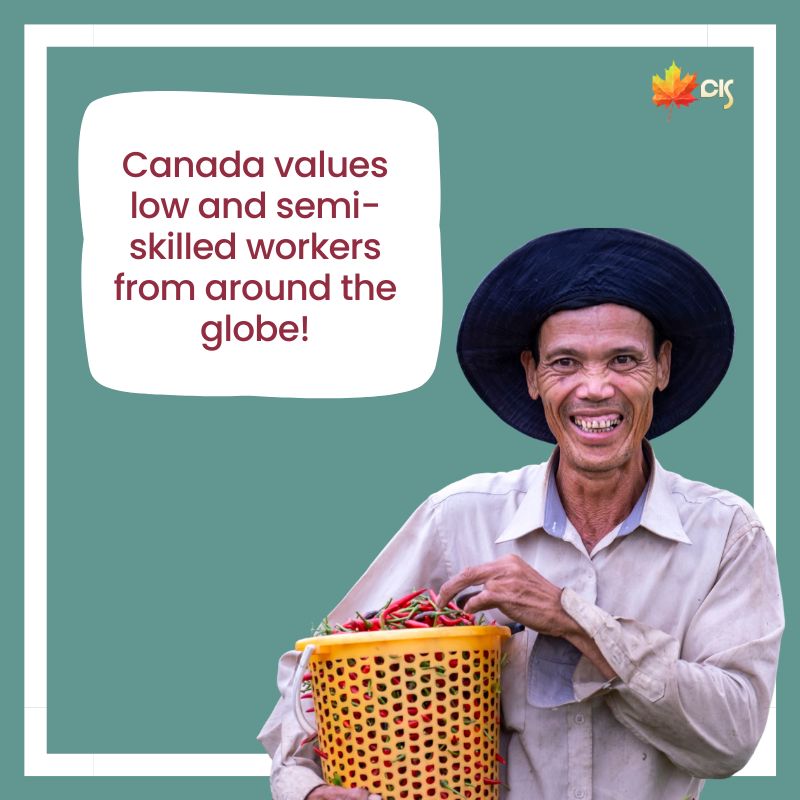immigration to canada for low and semi-skilled workers
🏅 Top 10 Low-Skilled Jobs in Canada
If you dream of working in Canada despite having little or no work experience, know that it is possible. Many people are choosing to live in Canada without the need to be skilled workers. Job opportunities in Canada depend on the Canadian economy and labor needs. To give you an idea of the top 10 low-skilled jobs in Canada for foreigners, we’ve listed them down with their average wages and requirements.
Average Salary: $48,384 (per year)
Requirements: A valid G1, G2, M, M1, or M2 Ontario license, pass a vision test, medical report, pass a knowledge exam on operating tractor trailers, pass a road test for Class A (R).
Average Salary: $41,096 (per year)
Requirements: A minimum of a high school diploma or GED certificate.
Average Salary: $28,889 (per year)
Requirements: A minimum of a high school diploma or GED certificate.
Average Salary: $33,287 (per year)
Requirements: You must finish a meat-and-fish-cutting vocational training program or a three-year meat cutting apprenticeship before applying for work.
Average Salary: $23,400 (per year)
Requirements: To be a professional waiter or waitress, one must complete a 1 to 2-year apprenticeship course, postsecondary education, or vocational school courses.
Average Salary: $23,264
Requirements: One must have basic knowledge of farming in order to get a job, along with a first aid certification.
Average Salary: $33,150
Requirements: Basic knowledge of farming usually acquired from working in a family farm in order to get a job.
Average Salary: $39,546
Requirements: Completion of post-secondary education and a trade certificate.
Average Salary: $63,980
Requirements: Must be at least 16 years old, acquire a Grade 10 education, and completed courses in math.
Average Salary: $76,050
Requirements: Completion of a 4 or 5-year industrial electrician apprenticeship program, or more than five years of trade-related experience, and some high school education is required.
Table of Contents
👨🏭 Who Are Considered Low-Skilled Workers?
Low-Skilled Workers in Canada are considered to have work experience in the trades, primary and industrial sectors, sales and services, as well as specialized administrative and assistant jobs.
The Employment and Social Development Canada (ESDC) classifies semi-skilled employees as:
- Skill Type C: Professions that typically need a secondary education or occupational training.
- Skill Type D: Professions where on-the-job training is given.
🛬 Immigration to Canada for Foreigners
Unskilled and semi-skilled foreign workers contribute significant value to Canada, and the country welcomes them via different work permits and visa procedures. However, skill shortages are prominent in many sectors due to an aging population and a primarily skilled workforce. If you have no post-secondary education, no worries! You should still be able to find work in Canada.
Would you want to move to Canada and improve your quality of life? In the “Immigration Pathways for Work in Canada” section, you’ll find the three simplest routes for unskilled workers who wish to immigrate.

📝 Immigration Pathways for Work in Canada
This program was developed for foreign employees who have received a job offer and who want to move to Canada. The PNP offers the opportunity to migrate to any province of your choice, although requirements for each province may vary. Five popular PNPs for unskilled migrant laborers are:
- Saskatchewan Immigrant Nominee Program (SINP): For agricultural, hotel and tourism workers, truck drivers, and trade workers.
- Ontario Immigrant Nominee Program (OINP): For unskilled workers with job offers.
- British Columbia Provincial Nominee Program (BC PNP): For entry-level low-skilled workers.
- Alberta Immigrant Nominee Program (AINP) and Manitoba Provincial Nominee Program (MPNP): For farming and rural in-demand jobs.
Agricultural labor is in high demand for Canadian farmers. This program allows low-skilled workers with work experience in agricultural and livestock industries to work in Canada. The program’s only qualification is that you have one year of non-seasonal experience in jobs. There are a few further requirements such as language tests, proof of funds, and educational background.
This pathway is for unskilled workers who want to relocate to any of the Atlantic provinces of Canada: Newfoundland and Labrador, Prince Edward Island, New Brunswick, and Nova Scotia. This is one of the quickest routes since you do not need Canadian job experience to be qualified. A job offer from a company in one of these provinces is what you will need to work in Canada.
If you wish to work in Canada on a temporary basis, this immigration option allows foreign workers who are neither a Canadian citizen nor a permanent resident to work in Canada in jobs that are short of Canadian workers.
🏘️ How to Apply for Permanent Residency as a Migrant Worker
For low-skilled workers, the Provincial Nominee Program is the most advantageous route to take because the Express Entry Canada system integrates with the Federal Skilled Worker Program, Federal Trades Program, and the Canadian Experience Class, all of which require some level of education or training.
PR TIP 1
You will need to meet several requirements, as well as acquire a sufficient number of points, in order to be considered qualified.
PR TIP 2
You will also be required to demonstrate that you have at least the bare minimal proof of funds by submitting a statement of bank balance.
These are just two of the numerous criteria that must be met to qualify for permanent resident status. However, keep in mind that obtaining permanent residency in Canada as a low-skilled worker will require several years of work experience in your field. In the meantime, it is best to apply for a temporary work permit with the possibility of renewal to gain enough work experience to qualify for one of Canada’s immigration programs, such as the Provincial Nominee Program.
✔️ Benefits of Working in Canada for Foreigners
Although there may be small advantages for unskilled workers when it comes to working in Canada, it doesn’t necessarily mean there are absolutely 0 advantages! 😉 Most of these benefits will actually be worth the move, such as:
People who get a Low-Skilled Worker Visa are permitted to reside and work in Canada for two years.
Under the particular employment offer, the Low-Skill work visa may be extended for up to 24 months of labor.
Working in Canada as a low-skilled worker provides career growth and work experience for when you apply as a skilled worker through any of Canada’s immigration programs, eventually leading to permanent employment/residency.
It’s common for a college diploma graduate to waste time in the first few years of their career by not gaining enough real-world experience. Unlike unskilled workers who are given firsthand tasks, this provides unskilled workers with better job opportunities.
📩 Application Process For The Young Professionals Program
For unskilled workers, the best way for you to become a permanent resident would be through the Provincial Nominee Program.
You must have worked full-time (or part-time equivalent) for a minimum of 12 months in Canada, within the three years before you apply and meet or exceed any of Canada’s required language levels.
Typically, it takes approximately 45 days for IRCC to process PR cards for new permanent residents after they have sent their applications. Approval of PR Cards usually takes 104 days.
The best provinces for unskilled workers include any of the following Atlantic provinces:
Nova Scotia, Prince Edward Island, New Brunswick, Newfoundland and Labrador, and the Gaspé region of Québec.
🍁 Immigration Updates for Low-Skilled Workers
According to the findings of a Ryerson University research, Canada’s low-skilled citizens should have a higher-volume route to permanent residency.
A policy brief from Ryerson University recommends that Canada do more to keep lower-skilled temporary residents in Canada. The CERC chair’s paper on migration and integration was released as a request for proposals (RFP). The short-term migration strategy proposes that Canada implement a program that focuses specifically on unskilled temporary foreign workers who wish to apply for permanent residency. Canada is also asked to implement new immigration rules that would protect foreign domestic workers from low wages.
🏠 Permanent Residency in Canada VS Citizenship For Low and Semi Skilled Workers
For low and semi-skilled workers, both permanent residency and Canadian citizenship offer valuable opportunities. Permanent residency provides a pathway to stability and integration, while Canadian citizenship provides the highest level of rights and privileges, including full participation in civic life.
Considerations for Low and Semi-Skilled Workers:
Path to Citizenship: Low and semi-skilled workers may choose to pursue Canadian citizenship to fully integrate into Canadian society and gain political rights.
Long-Term Stability: Permanent residency provides stability and long-term residence options, while citizenship offers the highest level of permanence.
Employment Flexibility: PR status allows for job changes without the need for a new work permit, but citizenship provides complete employment mobility.
To know more about the benefits of being a citizen in Canada, click on the photo!






